Drug Addiction
Our drug rehab programs are designed to provide comprehensive and personalized treatment for individuals struggling with substance use disorders. Contact us today to learn more about our drug rehab services and take the first step towards a healthier, substance-free life.
At Harmony Ridge Recovery Center WV, a pioneer among drug rehab centers in WV, we understand this crisis deeply – and have made it our moral mission to help. If you or a loved one are in need, our comprehensive drug rehab in WV is at your disposal. Don’t hesitate to contact us!

Drug addiction is undeniably a prevalent phenomenon across the US. In 2017, the year when the HSS declared opioid misuse a public health emergency, the AAC reported that a staggering 38% of adults “battled an illicit drug use disorder”. Since then, more and more people from all walks of life face drug abuse and, increasingly often, drug addiction.
Types of Drug Addiction That You Can Get Treated for in Harmony Ridge Recovery Center WV
In moderation and with proper use, there are prescription drugs that can help make our lives easier. They can ease pain, help treat chronic conditions, and more. However, when misused, both pharmaceutical and illicit drugs carry a real danger of addiction. People often underestimate just how easy it is to lose your footing and cross that line from moderation to addiction. To address this, our West Virginia drug rehab center offers extensive, drug-specific treatments for addiction to:
- Ambien. A sedative-hypnotic medication, approved by the FDA to treat insomnia and other sleep disorders.
- Barbiturates. Sedative-hypnotic medications that act as depressants to treat insomnia, anxiety, seizure disorders, and other ailments.
- Benzodiazepines. Very commonly used depressants, which treat an array of disorders such as insomnia and panic attacks.
- Opiates. A subcategory of opioids, the overprescriptions of which fuel the nationwide opioid crisis.
- Fentanyl. A synthetic opioid that is typically used as a painkiller. The recreational use and misuse of Fentanyl have both seen stark increases over the past years.
- Stimulants. A drug category in itself that includes Adderall, Ritalin, Concerta, etc. Stimulants also see considerable misuse beyond their intended purpose of treating ADD and similar disorders.
In addition, our West Virginia drug rehab center offers treatments for typically illicit drugs:
- Marijuana. The only substance in this list which does enjoy legal status in some states. Although it does have medical uses, marijuana still carries serious addiction risks.
- Cocaine. A famous stimulant drug, cocaine is highly addictive and carries serious health risks – especially in tandem with abuse of other drugs.
- Heroin. An illegal opioid, heroin remains at the forefront of the drug epidemic – with over 800,000 Americans having reported past-year heroin use in 2018.
- Meth. Medically known as Methamphetamine, meth is currently the second most commonly used illicit stimulant in the USA.
Whether legal or illicit, all of these drugs carry a very serious risk of addiction. Each of them requires a different approach, however – depending on both how they function and how they’re being abused.
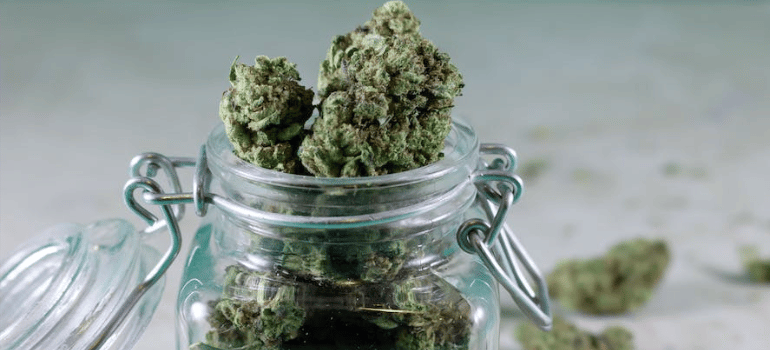
What Our Drug Rehab Program Entails?
If you’re ready to take the first step toward drug rehab in WV, our extensive, flexible program offers to help guide you to the freedom from addiction that you deserve.
Of course, each individual journey will differ from the next, as regards the duration of each phase, the intensity of care, and more. However, our drug addiction treatment center follows an established, tried-and-tested structure to guide you on your journey.
#1 Detox
The very first step of rehabilitation in a drug addiction treatment center comes in detoxification, and drug rehab in WV does not differ in this regard. Proper detox is imperative as it allows the body to rid itself of physical dependency on any given drug.
At Harmony Ridge Recovery Center WV, our program’s offerings begin with medication-assisted treatment (MAT) where necessary. In cases where natural, non-medical abstinence cannot yield results, medication can offer a safe, efficient alternative. It can help ease cravings and manage withdrawal symptoms, thus mapping out the path to recovery.
In our MAT process, we use naltrexone and buprenorphine, two FDA-approved medications. Those are prescribed on a case-by-case basis and administered under strict supervision by our licensed staff. In doing so, we can ensure that detox is seamless and that no new dependencies are formed during this crucial stage.
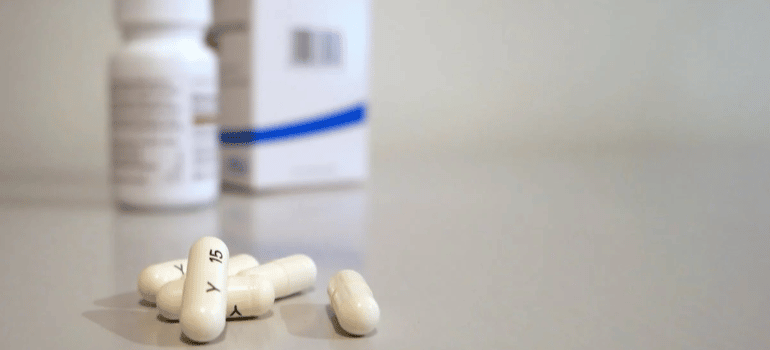
#2 Intensive Outpatient programs and residential rehab
Following a successful detox, our drug addiction treatment center offers different types of treatments, depending on each individual’s needs and progress. The two main options for this stage of our drug rehab West Virginia process are:
- Residential Rehab – a program that offers a safe and comfortable environment in residential facilities. During this program, our patients get 24-hour medical and clinical supervision, allowing them to heal physically and emotionally. This program is robust, yet highly individualized, to facilitate a successful recovery.
- Intensive Outpatient Program (IOP) – a step down from residential rehab, but still intensive and thorough, IOPs are ideal for those with mild to moderate cases of addiction. Our IOP offers the option for patients to receive due care while living at home, as they begin to reintegrate into everyday life. Its average length is 30 days, but the exact duration ultimately depends on the patient’s needs and progress.
If a patient is found unfit for either of these after detox, relapses, or otherwise needs intensive care again, there is also the option of partial hospitalization programs (PHPs). Conversely, if they’re progressing well, they may opt for sober living homes before completing their recovery process. Both of these options we’ll cover in the next section.
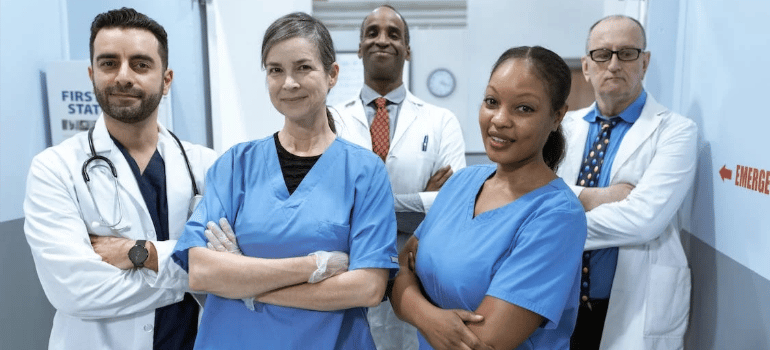
#3 Aftercare
Once a patient has successfully completed rehabilitation at our drug addiction treatment center, they may finally progress to our aftercare program. This is typically the final step after attending drug rehab centers in WV. Harmony Ridge Recovery Center WV is very confident in doing so as well.
Aftercare programs can differ considerably, but all will typically include:
- Recovery meetings and 12-step programs
- Acquiring a sponsor
- Individual and group therapy sessions
- Family support education
- Recreational and therapeutic activities
As the name suggests, aftercare programs cement long-term recovery after going through the rehab process. They hinge on highly individualized relapse prevention plans that we develop together by the end of the rehabilitation process. They allow patients to build strong connections with peers and therapists, offering continuous support and social engagement throughout their recovery journey after completing a comprehensive drug rehab WV provides.
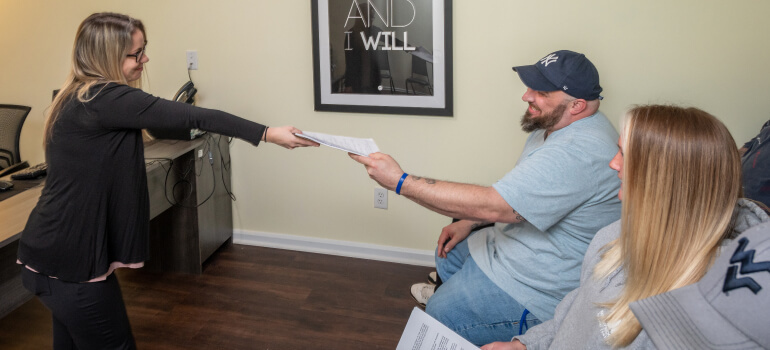
A Detailed Look at Our Drug Rehab WV Program Options
Having discussed the program at our drug addiction treatment center itself, we feel that you should get a full insight into each of the treatment plans we offer to patients looking for a fresh start. To prevent any misconceptions and avoid confusion, Harmony Ridge Recovery Center WV offers the following analysis of our drug rehab West Virginia treatment programs.
Partial Hospitalization Program and Its Benefits
First, we delve into our Partial Hospitalization Programs (PHPs). This is the option that an increasing number of drug rehab centers in WV offer, as it has proven to offer great results for patients looking to avoid having to go through the recovery process alone.
In brief, as the name suggests, PHPs entail partial hospitalization, offering a perfect solution between inpatient programs (where patients reside in medical facilities) and outpatient programs (where patients can live at home). They are a step above IOPs in terms of intensity, but a step below your textbook inpatient programs.
This meld of intensive care and flexibility primarily caters to the needs of patients with:
- Severe cases of addiction
- Co-occurring mental health disorders, “dual diagnosis”
- A need for higher levels of care
Despite its flexibility, this type of program offers immense benefits to patients who need such an approach. The primary ones include:
- Closer medical supervision. Easier access to medical professionals ensures the patient receives due care whenever needed.
- Medical care. Unlike less intensive programs, PHPs offer medication to help patients deal with withdrawal symptoms and ensure successful detoxification.
- A stronger focus on therapy. PHPs are typically more focused on individual and group therapy than on other programs, as they often need to treat the underlying factors of severe addiction cases.
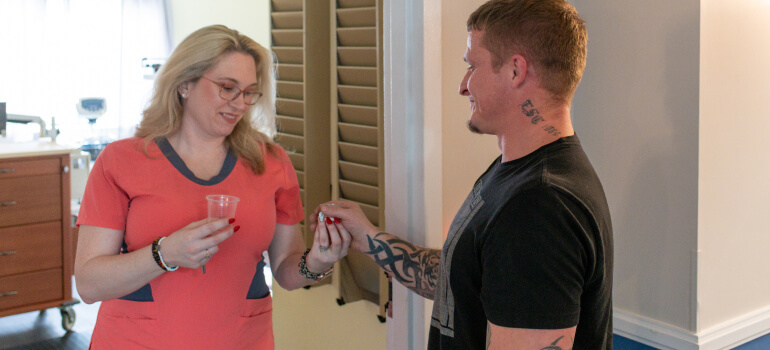
Differences Between Residential & Intensive Outpatient Programs
As residential and intensive outpatient programs are the foundation of our drug rehab WV Recovery Center, we should explain their differences in a more consolidated manner.
Residential programs cater to more severe cases of addiction and offer around-the-clock medical supervision. They set up a daily schedule for patients to follow, and will more often include medication support where needed. To make the process more welcoming and effective, they also encourage socialization and recreational activities within the residential drug addiction treatment center.
In contrast, IOPs bridge residential programs with outpatient ones, where the patient enjoys the flexibility of being able to live outside of the designated drug addiction treatment center. They typically best cater to mild and moderate cases of addiction and may lean more heavily into psychotherapy than medication management.
Both are viable and highly effective approaches to treatment, and each comes with its own benefits. Opting for one over the other will typically depend on a patient’s exact needs and progress, and both will still offer additional flexibility to best meet said needs of patients.

Aftercare - a Crucial Part of Each Recovery
Finally comes aftercare, a vital part of any drug rehab WV patients rely on. Aftercare, as highlighted above, is key to ensuring relapse prevention in a few different ways:
- Keeping communication channels with therapists open helps patients who fear they might relapse to seek help early on.
- Encouraging the patient to socialize through group therapy and outings among other practices helps them maintain a sense of belonging while in the drug addiction treatment center.
- By developing a relapse prevention plan during previous stages, aftercare promotes self-care and allows the patient to build self-reliance and confidence.
Contrary to popular belief, aftercare is not by any means a needless tail-end to rehabilitation. It is a crucial part of each recovery process and a vital safeguard against the ever-present danger of relapse.

The Therapies & Treatments Harmony Ridge Recovery Center WV Offers
We nurture and maintain the mindset that rehab is a highly personal and delicate experience. No two cases of addiction are identical, so no two treatments can be either. To address this and best meet each patient’s needs, at our drug addiction treatment center we offer the following types of psychotherapy programs:
- Cognitive Behavioral Therapy (CBT). A very prevalent and effective form of psychotherapy for drug addiction that combines cognitive and behavioral therapy principles.
- Dialectic Behavior Therapy (DBT) or “talk therapy”. An almost equally common form of psychotherapy that centers on coping mechanisms.
- Rational Emotive Behavior Therapy (REBT). A type of psychotherapy akin to CBT, with similar uses and effectiveness.
- Eye-Movement Desensitization and Reprocessing (EMDR). A revolutionary type of psychotherapy that consists of 8 phases and helps patients achieve recovery through disassociation.
In addition, to best implement our holistic approach to treatment, we also offer the following types of therapy:
- Individual therapy – where patients can feel safe and open up to their therapist.
- Group therapy – where group dynamics can further help the individual externalize their challenges and heal.
- Family therapy – allows patients and their families to renegotiate their relationships and move forward.
- Art therapy – offers an outlet for creative expression and allows patients to thrive.
- Motivational interviewing – a type of counseling akin to CBT that focuses on what the patients want and centers on their needs.

What is Dual Diagnosis & How to Cope With It?
Having mentioned it before, here we should also note the significance of dual diagnosis – starting with what it is. The AAC defines dual diagnosis in the context of drug addiction as follows:
“[A] dual diagnosis refers to the phenomenon of having a substance use disorder (SUD) and one or more co-occurring psychiatric disorders simultaneously. These co-occurring psychiatric conditions may include a range of mental illnesses [,] such as schizophrenia, post-traumatic stress disorder (PTSD), bipolar disorder, depressive disorders, or generalized anxiety disorder.”
This is, unfortunately, quite common, as roughly 20% of Americans who suffer from mental health disorders also have a substance abuse disorder. In such cases, one disorder will very often fuel the other, resulting in a vicious cycle with few ways out.
Coping with a dual diagnosis on your own can present very serious challenges and will be impossible for many. To best address it, you should first get properly diagnosed by a professional at a reputable drug addiction treatment center and then work with them toward a personalized treatment plan. The combinations of co-occurring disorders are near-endless and their severity varies considerably, so you shouldn’t attempt to self-treat or disconnect one from the other.

Facts about Drug Addiction
To quantify just how serious an issue drug addiction has become nationwide, here are some mind-boggling statistics for you to take under consideration:
- NIDA reports that “20.4 million people in the United States were diagnosed with SUD in the past year.” Of them, barely over 10% received treatment.
- NCDAS estimates that “half of people 12 and older have used illicit drugs at least once”. As of 2020, 37.309 million Americans aged 12 years and older were current illegal drug users.
- AAC reports that 8.5 million American adults suffered from co-occurring disorders in 2017. By 2019, that number had risen to 9.5 million.
These numbers may seem harrowing, and to some extent they absolutely are. The drug addiction epidemic is a national issue that deserves unfaltering attention. However, these numbers can also help encourage individuals to seek out assistance.
For one, they should underline the real danger of addiction; NCDAS also reports over 700,000 overdose deaths since 2000. But perhaps more importantly, they should signify just how vast and rightfully discussed this issue is. Drug addiction no longer has the stigma it once had, nor is it a challenge that you have to face alone.
Science has advanced in strides and so has social consciousness on drug addiction. Peer support options now abound, and therapists have become increasingly aware of the need for holistic, individualized treatment in drug rehab centers in WV.
Hopefully, all of these factors should help more individuals muster the courage to seek help in the form of drug rehab WV programs. It won’t be easy, as the first steps are always the hardest, but the process has become more efficient and welcoming than ever before. Freedom from substance abuse, and the risks it entails, is a noble goal and a worthy pursuit – and Harmony Ridge Recovery Center WV will be happy to accompany you throughout this journey.
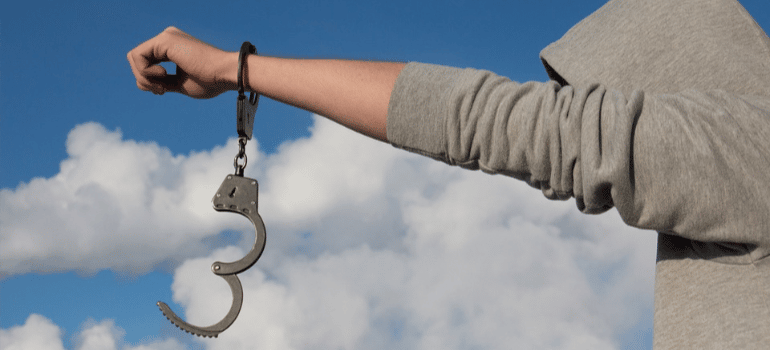
What are the Symptoms of Drug Addiction and Who Should Consider Our Programs?
Having discussed the above-mentioned programs and treatment options, we should explore the early symptoms of drug addiction. Whether you identify them in yourself or a loved one, doing so early on will always be beneficial.
The exact symptoms and their severity will vary considerably, depending on age, substance, and other factors. Still, some signs are largely universal. Among them, AAC identifies the following:
- Difficulties at school or work
- Poor hygiene and lacking self-care
- Social isolation
- Financial troubles
- Lack of energy and loss of appetite
- Physical signs such as weight loss, bloodshot eyes, and poor skin tone
None of these signs are conclusive, of course, but they’re often indicative of an underlying issue. Once you do confirm a drug addiction, you may quickly consult a professional at a drug addiction treatment center to determine your best course of action.
Toward that end, our approach to treatment makes us confident in our ability to meet our patients’ every need. You should consider our programs if:
- Drug addiction has impacted your everyday life and relationships.
- Co-occurring disorders hamper your ability to break free from addiction.
- Narrow-scope treatments have failed to meet your needs in the past.
- You want or need the flexibility to remain at school or employed during rehabilitation.
- You want a strong aftercare program to reassure you that you will not relapse.

The Most Common Reasons Why People Relapse & How To Prevent It
The reason why we focus so strongly on relapse is that it is extremely common. AAC finds that a staggering “85% of individuals relapse and return to drug use within the year following treatment”. In addition, “researchers estimate that more than 2/3 of individuals in recovery relapse within weeks to months of beginning addiction treatment”.
There are multiple reasons for this, but the most common ones include:
- Poor management of withdrawal symptoms or cravings;
- Insufficient relapse prevention skills;
- Untreated co-occurring disorders;
- A lack of self-fulfillment and personal growth;
- A poor support network after leaving the drug addiction treatment center.
Unfortunately, there is no single, universally applicable solution to relapse. Preventing it requires a robust rehabilitation process, which will:
- Provide the patient with the necessary relapse prevention and trigger management skills.
- Offer an effective blend of recreational and educational therapies that will allow the patient to grow and thrive.
- Build a resilient aftercare framework where the individual can seek help and feel supported.
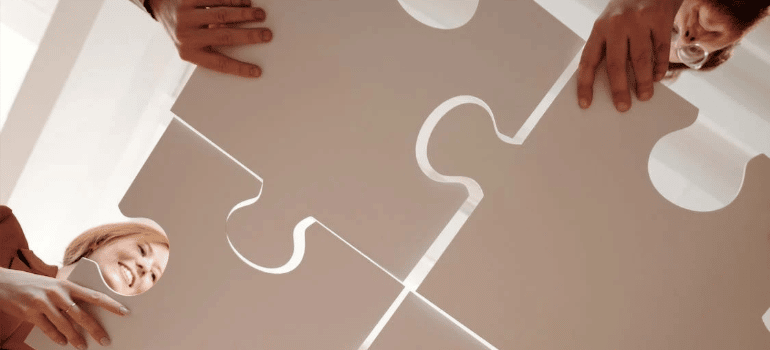
What Can You Expect From The Treatment in Harmony Ridge Recovery Center WV?
At Harmony Ridge Recovery Center WV, it is our firm grasp of those facts that makes us confident in our programs. Our drug rehab West Virginia programs and treatments will always strive to meet your needs and exceed your expectations, to align with our core mission. Our team of certified and qualified medical care professionals will ensure that you receive:
- Absolute confidentiality during your assessment
- Consistent medical supervision and thorough support throughout detox
- A highly personalized rehabilitation program that will suit your unique circumstances perfectly
- Holistic treatment, healing the mind and body simultaneously
- A robust aftercare program that will help prevent relapses
With the perfect blend of our comprehensive therapy options and years of experience, you should expect nothing less than a seamless drug rehab in WV always centered on you and your unique case.
Lose Yourself in Nature and Find Peace in Harmony Ridge Recovery Center WV
In addition, our unique location offers substantial benefits to make your drug rehab in WV as pleasant as possible. If you need help visualizing it, just take the time to explore our photo gallery.
Our residential drug addiction treatment center is surrounded by woods, allowing our patients to reconnect with nature and attain inner peace. In stark contrast to busy urban cityscapes, our location allows for serene hiking tours, picnics, and other recreational activities that have been proven to be therapeutic and rejuvenating. The benefits of nature to rehabilitation and well-being are well-documented, as PsychologyToday finds.

Ways How You Can Pay for Your Drug Rehab in West Virginia
It’s natural to worry about the costs associated with such a holistic experience. The extent and diversity of our rehab and treatment programs may make them sound expensive, but they don’t have to be – not with our insurance coverage options. But fear not; our programs are more affordable than most drug rehab centers in WV and offer plenty of financing options.
We accept most major insurance plans, including:
Due to the Affordable Care Act and the Mental Health Parity And Addiction Equity Act (MHPAEA), all plans must cover behavioral health treatment, mental and behavioral health inpatient services, and substance use disorder treatment. However, depending on your state, plan, and provider, exact coverage will often vary.
Other payment options, should your insurance provider not cover the full cost of treatment, include:
- Direct payments
- Personal loans
- Medicaid
Should you need additional information on payment options or anything else, feel free to give us a call at (855) 942-3797. The representatives at our drug addiction treatment center are available 24/7 to answer all of your questions and explore your financing options.

Contact Us & Start Your Journey Today!
The journey to recovery is never easy, and the first step is always the hardest. Still, whether it’s for you or a loved one, freedom from drug addiction is a gift worth sacrificing for. At Harmony Ridge Recovery Center WV, we’re fully prepared to accompany you every step of the way, toward the new life you deserve. If you’re ready, contact us today and embark on a journey like no other.
FAQ
How long does drug rehab last?
Every journey to recovery differs significantly from the next, so it’s hard to pin down a specific number. The duration of rehab will depend on an array of factors, including addiction severity, the type and duration of the addiction, co-occurring mental health disorders, exact services needed, and the individual’s own progress and resolve. That said, each part of rehab has some common durations we can go through.
First, detox will typically last for at least one week and may extend depending on the substance’s withdrawal symptoms and co-occurring disorders. Next, main rehab programs (ie Inpatient, PHP, and IOP/OP programs) may last anywhere between a month and four but may also be extended as needed. Finally, stay programs such as sober living homes may last from a minimum of one to three months to eighteen months or more.
How long does aftercare last?
The duration of aftercare programs in drug rehab centers in WV will also vary quite significantly, depending on each individual’s needs. For milder cases, aftercare programs may only last for a few months. For more severe cases or dual diagnoses, such programs can extend to a year or more. In addition, aftercare programs which include stay programs can technically last for years, as highlighted above.
That said, it is generally recommended to remain in an aftercare program for at least one year. Aftercare is a continuous process, and its later stages may only include 12-step meetings and little more that interrupts daily life. As such, aftercare can be discreet and non-demanding enough to maintain for long periods without inhibiting the individual’s newfound life of abstinence.
How much does drug rehab cost?
Rehab costs will also differ quite significantly, and too much so for us to quantify any exact figure. First, costs will differ considerably depending on the programs needed and their duration, additional services such as pharmacotherapy, and more. Second, final costs on the client’s side will also vary notably depending on their health insurance plans and their coverage.
In all cases, financing is a crucial part of rehab to secure early, so as to allow the necessary programs to conclude with no interruptions. For this reason, we strongly recommend that you explore the subject in due depth beforehand. If you do choose Harmony Ridge Recovery Center WV, our representatives will be happy to help you in this regard.
Is it possible to avoid relapsing?
As highlighted above, relapse is, unfortunately, very common. Some studies cited by NIDA quantify chronic relapse rates as anywhere between 40 and 60%, while others like those cited by AAC find even bleaker numbers at 85%. Exact rates do fluctuate over time, and they do differ across different types of addictions, but addiction is generally very hard to overcome on the first try. The most lenient figures for any substance rarely drop below 40%, which can be very discouraging.
Still, while relapse may never be fully ruled out, its likelihood continues to decrease as new treatments emerge. In combination, a thorough rehabilitation and a robust, long-lasting aftercare program have been found to successfully do so. In addition, the more an individual builds up their resolve and falls back on a strong support network, the less likely they become to relapse. As such, we sincerely hope relapse will be completely avoidable in the future.
Can all types of drug addictions be treated?
Yes. Different types of addiction do require different treatments, as highlighted above, which will affect rehabilitation duration, costs, and the overall experience. In addition, some addictions are generally harder to treat, and such factors as dual diagnoses or PAWS may also inhibit treatment.
However, all types of drug addictions can be treated. With a proper treatment process, case-appropriate therapies, and the flexibility to personalize the program’s course over time to best facilitate a full recovery, there is no addiction that cannot be treated.
How do I know which program works best for me?
Whether for you or your loved ones, choosing the best program and drug addiction treatment center will often be difficult. You may not have full knowledge of the situation or may be inadequately informed about a specific type of addiction that concerns you. As such, extensive research and professional help are always highly advisable. If you do choose Harmony Ridge Recovery Center WV, our team will strive to present all choices thoroughly and offer the best advice for your individual case.
Factors on your end that should affect your choice should be noted, however. For example, different sex, age, and occupation groups have different needs – such as pregnant women, children and the elderly, and veterans, respectively. Duties you may have, such as maintaining employment or caring for children, should also be noted; such factors will affect whether you can afford to live away from home for prolonged periods of time. Such information is vital, so we strongly suggest that you share it as you explore your options.
Jump To Section
Begin Your Journey to Healing Here
Ask me about recovery, I can help you!
Our recovery specialists are standing by 24/7 to help you or your loved one.
Or call us: 


